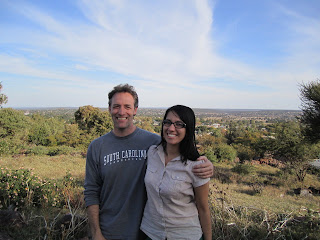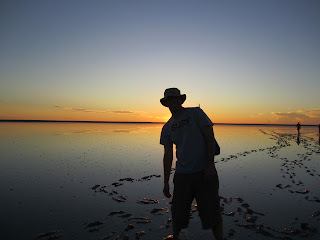In my previous blog I indicated that I was going to write about traveling in Botswana but I’m going to wait until after I’ve flown on Air Botswana in a couple of weeks, that way I’ll be able to cover the full spectrum of traveling in Botswana: Public bus, minibus, combis, hitching and air travel. In the mean time I want to focus this blog entry on a popular question that I’ve had a number of people ask: “What about the work? Do you feel like you’re making a difference there?” I posted this on Facebook a few days ago and have since made some additions and revisions for the blog entry.
My initial response to the question of whether I think I’m having an impact here in Botswana has been “I hope so” or “It’s too soon to tell.” I have realized though that I need to really step back and consider the question as it is as relevant now 4 months into my Peace Corps service, as it will be when I leave Botswana in June 2013. The question of whether we’re making a difference in our respective communities is a question that all current, past and future Peace Corps Volunteers (PCVs) ponder and debate exhaustively. Why? Because “making a difference” or “having an impact” is a primary driver in the decision making process for most of us and will be a key question to consider when we are trying to determine the “success” of our two years (or more in some cases) at our site in our assigned country.
At first it seems premature to even consider whether or not I’m making a difference after being in Botswana for just over 4 months. However, thinking it’s a premature question to consider is a good sign that when it comes to Peace Corps service I’m still looking for tangible results as a measure of success or impact and not considering the bigger picture in terms of my service here in Botswana. When you travel or live abroad you have a far greater appreciation of how much more results-orientated we are as Americans in comparison to much of the rest of the world. Our focus on results starts in school with grades and test scores being the primary methodology of determining the relative success of our education. The focus on results only increases once we enter the working-world, almost no matter our career choice. We are given goals, tasks and responsibilities and are evaluated based on criteria relative to the results associated with the given goals, tasks and responsibilities. Whether you’re a journalist, marketing executive, welder, trucker, professional voice-over actor, teacher, bartender, radio DJ, or CIA Operative, you will be judged by your results against a job description or financial performance or some other similar criteria.
I’m not judging American culture and its focus on results that can be measured. It is what it is, but it is not an adequate framework for evaluating my time as a Peace Corps Volunteer when much of the impact I am having and will have is intangible. Making a difference as a PCV is as connected to our day-to-day interactions and communication within our communities as it is to specific tasks we may perform or projects we are faciliating. Building a well, designing a water filtration system, teaching English, building a school, working as nurse in a clinic, designing an HIV/AIDS prevention strategy, setting up micro-financing for a small business enterprise are all examples of specific projects and responsibilities assigned to PCVs worldwide and are vitally important in the context of the local communities that are served by PCVs. Just as noteworthy, if not as important in the cross-cultural big picture, are the daily interactions of PCVs in their communities and countries.
I expect that work that I will be able to do at the United Nations High Commission on Refugees (UNHCR) refugee camp in Dukwi (about 30 minutes from Sowa) to be challenging, meaningful, and potentially very rewarding as there will be some tangible results of my work to point to – whether its increased funding for a computer literacy center, or setting up income-generation projects for the refugees, or working on a strategy to increase the number of refugees that voluntarily get tested for HIV, as my work there will be more project-specific and focused. I also expect my work here in the District AIDS Coordinating (DAC) office to be rewarding and impactful, as well as frustrating, because I am now a small cog in the big wheel of Botswana Government bureaucracy and what impact I have will happen slowly, and will be met with resistance by the very bureaucracy I’m working for. That’s fine, I knew that going in and nothing in my first 7 weeks at the Sowa DAC office has altered my perceptions about this. I’ve worked at large, cumbersome bureaucracies (SC House of Representative) or bureaucratic institutions (SF Opera) so I feel like I’m prepared for the reality of incremental change, as different as that may look to me here in Botswana.
Capacity building, especially in the context of HIV/AIDS and the cultural behavior change(s) necessary to positively impact the lives of my community is by nature subtle and methodical. Measuring success will prove more challenging, and in fact the most significant impact I could have here may not happen while I’m here or even become apparent to me (or anyone else) while I’m here or for many years after. It could be something as simple as reaching one teenager about the importance of not taking sexual activity lightly, helping him or her understand that here are consequences to their decision to engage in, or not engage in, sexual activity in a country with such a high rate of teenage pregnancies, sexually transmitted infections (STIs), and HIV infection. He or she might attend a workshop sponsored by the DAC office here when they are 12, but act (or not act) on the information in that workshop for 2-3 years down the road. It could be a mother-to-be who suspects she might be HIV+ deciding that she should get tested for her sake and the sake of her unborn child because she hung on to a pamphlet that she received at an outreach event in her village three years prior. I may not ever truly know or appreciate the measurable impact I can have in my two years here, and that’s perfectly fine.
What is equally important during my time here is how I interact on a daily basis with the members of my community. Two of the three Peace Corps goals are about the “intangibles” of our service, promoting positive impressions of Americans, and facilitating education and communication about our host country. In that context, I and all other PCVs are really on the job 24/7. When I smile and say “Dumela rra,” or “Dumela mma” for the umpteenth time, no matter how tired or cranky I am, I’m having an impact. Every time I hand wash my clothes, or walk to my office, or take public transportation to travel, or allow a neighbor’s child to tutor me in Setswana, I’m acting like a member of the community, not a visitor, or tourist and therefore having an impact. When I smile and laugh at the kids running towards or after me yelling “Lekoga!” instead of getting mad or frustrated or ignoring them I’m having a positive impact. When I keep my cool and try to go with the flow when hardships or challenges arise, as they inevitably do, like power outages, non-functioning ATMs, or empty grocery shelves, I am having an impact.
Am I perfect in maintaining my composure, my enthusiasm in engaging with and living in my new community? No, but I, and my fellow PCVs are mindful of this and try the best we can to live at the level of our neighbors and integrate into our communities. I have a feeling that the impact I have here may not be known to me for some time, if ever, and as long as I live in the present, focusing on my daily interactions and communications, then I should be ok and it will be a rewarding and successful time spent here on the Salt Plains. At least that’s what I’m telling myself when there’s no power and its 120 degrees in my house for the 8th straight day. So yes, I and all of the PCVs here in Botswana are having an impact, every day, every hour. We, and our friends and family, may occasionally overlook daily interactions in our communities as part of the work we are doing because it’s not the “sexy” part of PC service (living abroad, traveling, learning new languages, teaching children) so often advertised and associated with life as a PCV, but it is a vital component of what makes our service so unique and hopefully fulfilling.
















